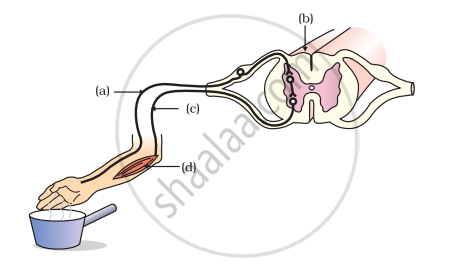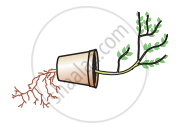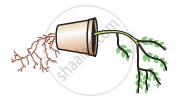Advertisements
Online Mock Tests
Chapters
2: Acids, Bases and Salts
3: Metals and Non-metals
4: Carbon and its Compounds
5: Periodic Classification of Elements
6: Life Processes
▶ 7: Control and Coordination
8: How do Organisms Reproduce?
9: Heredity and Evolution
10: Light – Reflection and Refraction
11: The Human Eye and the Colourful World
12: Electricity
13: Magnetic Effects of Electric Current
14: Sources of Energy
15: Our Environment
16: Management of Natural Resources
![NCERT Exemplar solutions for Science [English] Class 10 chapter 7 - Control and Coordination NCERT Exemplar solutions for Science [English] Class 10 chapter 7 - Control and Coordination - Shaalaa.com](/images/science-english-class-10_6:5f2b1b2038084cf381bfa42c826a928c.jpg)
Advertisements
Solutions for Chapter 7: Control and Coordination
Below listed, you can find solutions for Chapter 7 of CBSE NCERT Exemplar for Science [English] Class 10.
NCERT Exemplar solutions for Science [English] Class 10 7 Control and Coordination Multiple Choice Questions [Pages 57 - 62]
Which of the following statements is correct about receptors?
Gustatory receptors detect taste while olfactory receptors detect smell
Both gustatory and olfactory receptors detect smell
Auditory receptors detect smell and olfactory receptors detect taste
Olfactory receptors detect taste and gustatory receptors smell
Electrical impulse travels in a neuron from
Dendrite → axon → axonal end → cell body
Cell body → dendrite → axon → axonal end
Dendrite → cell body → axon → axonal end
Axonal end → axon → cell body → dendrite
In a synapse, chemical signal is transmitted from
dendritic end of one neuron to axonal end of another neuron
axon to cell body of the same neuron
cell body to axonal end of the same neuron
axonal end of one neuron to dendritic end of another neuron
In a neuron, conversion of electrical signal to a chemical signal occurs at/in
cell body
axonal end
dendritic end
axon
Which is the correct sequence of the components of a reflex arc?
Receptors → Muscles → Sensory neuron → Motor neuron → Spinal cord
Receptors → Motor neuron → Spinal cord → Sensory neuron → Muscle
Receptors → Spinal cord → Sensory neuron → Motor neuron → Muscle
Receptors → Sensory neuron → Spinal cord → Motor neuron → Muscle
Which of the following statements are true?
- Sudden action in response to something in the environment is called reflex action
- Sensory neurons carry signals from spinal cord to muscles
- Motor neurons carry signals from receptors to spinal cord
- The path through which signals are transmitted from a receptor to a muscle or a gland is called reflex arc
(i) and (ii)
(i) and (iii)
(i) and (iv)
(i) , (ii) and (iii)
Which of the following statements are true about the brain?
- The main thinking part of brain is hind brain
- Centres of hearing, smell, memory, sight etc are located in fore brain.
- Involuntary actions like salivation, vomiting, blood pressure are controlled by the medulla in the hind brain
- Cerebellum does not control posture and balance of the body
(i) and (ii)
(i), (ii) and (iii)
(ii) and (iii)
(iii) and (iv)
Posture and balance of the body is controlled by
cerebrum
cerebellum
medulla
pons
Spinal cord originates from
cerebrum
medulla
pons
cerebellum
The movement of shoot towards light is
geotropism
hydrotropism
chemotropism
phototropism
The main function of abscisic acid in plants is to
increase the length of cells
promote cell division
inhibit growth
promote growth of stem
Which of the following is not associated with growth of plant?
Auxin
Gibberellin
Cytokinin
Abscisic acid
Iodine is necessary for the synthesis of which hormone?
Adrenaline
Thyroxin
Auxin
Insulin
Choose the incorrect statement about insulin.
It is produced from pancreas
It regulates growth and development of the body
It regulates blood sugar level
Insufficient secretion of insulin will cause diabetes
Select the mis-matched pair.
Adrenaline : Pituitary gland
Testosterone: Testes
Estrogen : Ovary
Thyroxin : Thyroid gland
The shape of guard cells changes due to change in the
protein composition of cells
temperature of cells
amount of water in cells
position of nucleus in the cells
The growth of tendrils in pea plants is due to
effect of light
effect of gravity
rapid cell divisions in tendrillar cells that are away from the support
rapid cell divisions in tendrillar cells in contact with the support
The growth of pollen tubes towards ovules is due to
hydrotropism
chemotropism
geotropism
phototropism
The movement of sunflower in accordance with the path of sun is due to
phototropism
geotropism
chemotropism
hydrotropism
The substance that triggers the fall of mature leaves and fruits from plants is due to
auxin
gibberellin
abscisic acid
cytokinin
Which of the following statements about transmission of nerve impulse is incorrect?
Nerve impulse travels from dendritic end towards axonal end
At the dendritic end electrical impulses bring about the release of some chemicals which generate an electrical impulse at the axonal end of another neuron
The chemicals released from the axonal end of one neuron cross the synapse and generate a similar electrical impulse in a dendrite of another neuron
A neuron transmits electrical impulses not only to another neuron but also to muscle and gland cells
Involuntary actions in the body are controlled by
medulla in fore brain
medulla in mid brain
medulla in hind brain
medulla in spinal cord
Which of the following is not an involuntary action?
Vomiting
Salivation
Heart beat
Chewing
When a person is suffering from severe cold, he or she cannot
differentiate the taste of an apple from that of an ice cream
differentiate the smell of a perfume from that of an agarbatti
differentiate red light from green light
differentiate a hot object from a cold object
What is the correct direction of flow of electrical impulses?
Which statement is not true about thyroxin?
Iron is essential for the synthesis of thyroxin
It regulates carbohydrates, protein and fat metabolism in the body
Thyroid gland requires iodine to synthesize thyroxin
Thyroxin is also called thyroid hormone
Dwarfism results due to
excess secretion of thyroxin
less secretion of growth hormone
less secretion of adrenaline
excess secretion of growth hormone
Dramatic changes of body features associated with puberty are mainly because of the secretion of
estrogen from testes and testosterone from ovary
estrogen from adrenal gland and testosterone from pituitary gland
testosterone from testes and estrogen from ovary
testosterone from thyroid gland and estrogen from pituitary gland
A doctor advised a person to take an injection of insulin because
his blood pressure was low
his heart was beating slowly
he was suffering from goitre
his sugar level in blood was high
The hormone which increases the fertility in males is called
oestrogen
testosterone
insulin
growth hormone
Which of the following endocrine glands is unpaired?
Adrenal
Testes
Pituitary
Ovary
Junction between two neurons is called
cell junction
neuro muscular junction
neural joint
synapse
In humans, the life processes are controlled and regulated by
reproductive and endocrine systems
respiratory and nervous systems
endocrine and digestive systems
nervous and endocrine systems
NCERT Exemplar solutions for Science [English] Class 10 7 Control and Coordination Short Answer Questions [Pages 62 - 64]
Label the parts (a), (b), (c) and (d) and show the direction of flow of electrical signals in the given figure.

Name the plant hormones responsible for the following
- elongation of cells
- growth of stem
- promotion of cell division
- falling of senescent leaves.
Label the endocrine glands in the given figure.

In the given figure (a), (b) and (c), which appears more accurate and why?
 |
 |
 |
| (a) | (b) | (c) |
Label the parts of a neuron in the given figure.

Match the terms of Column (A) with those of Column (B)
| Column (A) | Column (B) |
| (a) Olfactory receptors | (i) Tongue |
| (b) Thermo receptors (temperature receptors) | (ii) Eye |
| (c) Gustatoreceptors | (iii) Nose |
| (d) Photoreceptors | (iv) Skin |
What is a tropic movement? Explain with an example.
What will happen if intake of iodine in our diet is low?
What happens at the synapse between two neurons?
Answer the following :
Which hormone is responsible for the changes noticed in females at puberty?
Dwarfism results due to deficiency of which hormone?
Blood sugar level rises due to deficiency of which hormone?
Iodine is necessary for the synthesis of which hormone?
Answer the following :
Name the endocrine gland associated with brain?
Which gland secretes digestive enzymes as well as hormones?
Name the endocrine gland associated with kidneys?
Which endocrine gland is present in males but not in females?
NCERT Exemplar solutions for Science [English] Class 10 7 Control and Coordination Long Answer Questions [Page 64]
Explain the function of the neuron.
What are the major parts of the brain? Mention the functions of different parts.
What constitutes the central and peripheral nervous systems? How are the components of central nervous system protected?
Mention one function for each of these hormones :
- Thyroxin
- Insulin
- Adrenaline
- Growth hormone
- Testosterone
Name various plant hormones. Also give their physiological effects on plant growth and development.
What are reflex actions? Give two examples. Explain a reflex arc.
“Nervous and hormonal systems together perform the function of control and coordination in human beings.” Justify the statement.
How does chemical coordination take place in animals?
Why is the flow of signals in a synapse from axonal end of one neuron to dendritic end of another neuron but not the reverse?
Solutions for 7: Control and Coordination
![NCERT Exemplar solutions for Science [English] Class 10 chapter 7 - Control and Coordination NCERT Exemplar solutions for Science [English] Class 10 chapter 7 - Control and Coordination - Shaalaa.com](/images/science-english-class-10_6:5f2b1b2038084cf381bfa42c826a928c.jpg)
NCERT Exemplar solutions for Science [English] Class 10 chapter 7 - Control and Coordination
Shaalaa.com has the CBSE Mathematics Science [English] Class 10 CBSE solutions in a manner that help students grasp basic concepts better and faster. The detailed, step-by-step solutions will help you understand the concepts better and clarify any confusion. NCERT Exemplar solutions for Mathematics Science [English] Class 10 CBSE 7 (Control and Coordination) include all questions with answers and detailed explanations. This will clear students' doubts about questions and improve their application skills while preparing for board exams.
Further, we at Shaalaa.com provide such solutions so students can prepare for written exams. NCERT Exemplar textbook solutions can be a core help for self-study and provide excellent self-help guidance for students.
Concepts covered in Science [English] Class 10 chapter 7 Control and Coordination are Control and Co-ordination in Human Being, Reflex and Reflex Action, Coordination in Plant: Tropism in Plants, Hormones in Animals, Human Nervous System, Human Endocrine System, Plant Hormones, Peripheral Nervous System (PNS), The Human Brain - Forebrain, The Human Brain - Forebrain, Central Nervous System (CNS), Neuron (Or Nerve Cell) and Its Types, Nerve Fibres, Major Division of the Nervous System, Nervous Pathways in Reflexes, Reflex Arc, Chemical Coordination, Types of Plant Hormones: Auxins, Types of Plant Hormones: Gibberellins, Types of Plant Hormones: Ethylene, Types of Plant Hormones: Cytokinins, Types of Plant Hormones: Abscisic Acid (ABA), Types of Plant Hormones: Ethylene, Pituitary Gland or Hypophysis Gland, Thyroid Gland, Parathyroid Gland, Pancreas (Islets of Langerhans), Adrenal Gland (Suprarenal Gland), Reproductive Glands (Gonads), Thymus Gland, Neuron (Or Nerve Cell) and Its Types.
Using NCERT Exemplar Science [English] Class 10 solutions Control and Coordination exercise by students is an easy way to prepare for the exams, as they involve solutions arranged chapter-wise and also page-wise. The questions involved in NCERT Exemplar Solutions are essential questions that can be asked in the final exam. Maximum CBSE Science [English] Class 10 students prefer NCERT Exemplar Textbook Solutions to score more in exams.
Get the free view of Chapter 7, Control and Coordination Science [English] Class 10 additional questions for Mathematics Science [English] Class 10 CBSE, and you can use Shaalaa.com to keep it handy for your exam preparation.




